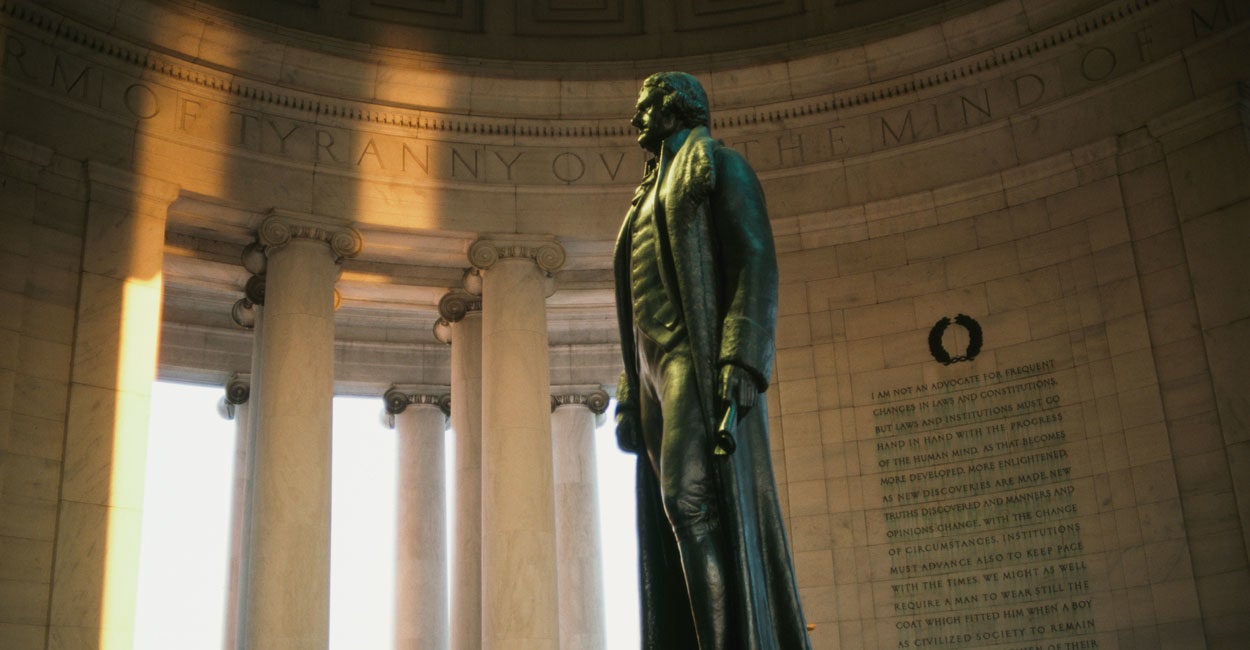“The Right Side of History” is a podcast dedicated to exploring current events through a historical lens and busting left-wing myths about figures and events of America’s past.
On this week’s episode, hosts Jarrett Stepman and Fred Lucas speak to Sen. Mike Lee, R-Utah, about the Declaration of Independence and how it makes America exceptional.
Lee is the author of the new book “Our Lost Declaration: America’s Fight Against Tyranny From King George to the Deep State.”
The Daily Signal depends on the support of readers like you. Donate now
The following is an excerpt from the interview with Lee:
Jarrett Stepman: So, now we have the pleasure of being joined by Sen. Mike Lee, who has written a new book, “Our Lost Declaration: America’s Fight Against Tyranny From King George to the Deep State.” Thank you so much for joining us.
Sen. Mike Lee: Thank you, pleasure to be with you.
Stepman: So, we’ll go right into, why did you write this book? Obviously the Declaration of Independence is, well, I mean, it is the seminal event of American history. Why did you think that Americans need to recapture a lost Declaration?
Lee: It’s occurred to me a lot lately that especially younger Americans are losing touch, they’re losing a connection with the principles of our founding. And I’ve written a couple of books about the Constitution. As I was writing those, it kept occurring to me, in order to fully understand, and implement, and protect, and defend the Constitution, you have to understand the Declaration.
It’s as though we’ve got a picture on the wall. The frame is the Constitution, but the picture itself is the Declaration, it’s the what we’re trying to protect, it’s what the Constitution is there to protect. It states and identifies the inherent dignity of the human soul, and the rights of human beings as against government. That’s why we need to understand it.
So, I wrote this book for all the parents and grandparents out there who know that their children and grandchildren aren’t getting the same education that they got in civics. This is to make it easier for them.
Stepman: I like the line at the beginning of your book, that it was the kind of moral framework of what this country is. And I thought it was interesting you actually said that 40% of Americans can’t identify Thomas Jefferson as the writer of the Declaration of Independence.
I mean, that’s a study fact, of course. When you get into these civics kinds of surveys, there are a lot of, I think, really sad facts about America’s knowledge of our history, and obviously the Declaration is this kind of critical moment and event.
But I think what you do well in this book is you break down what the declaration meant. And that it wasn’t just, of course, most people still remember the line [about] all men are created equal, and they are endowed with certain inalienable rights.
But you break down the things that led up to the Revolution … leading up to the Declaration of Independence. I mean, this wasn’t something that was done for light, transient causes. I think there are too many people who think, “Well, you know, were Americans really that oppressed at the time?”
And I think you make a very convincing case that yes, they were. There were so many, really, violations of Americans’ rights. It’s what Jefferson kind of broke down in the less well read part of the declaration. Can you explain what Americans were going through at that time, and why it led so many to believe that independence was necessary?
Lee: Sure. We have to remember, as I explain in the book, there are essentially three pieces to the declaration. There’s the preamble, which most people, if they know much about the declaration, know a few words out of that. That’s the part where we identify the fact that we’ve got certain inalienable rights, among them life, liberty, and the pursuit of happiness, that we’re endowed by our creator with these things.
The second part is the indictment section, that’s the one you’re referring to now, that sets up the list of grievances. If this were a Festivus celebration, this would be the airing-of-grievances portion of what we were doing with King George III.
And then the final part is where we explain, and therefore what? Well, we’re no long going to be part of Great Britain; we’re leaving, we’re done. Don’t let the door hit you on the way out.
But back to the focus of your question, which is the grievance section, the indictment section. King George III had engaged in a long train of abuses, including withholding his consent from legislation, including withholding the consent of the sum of the states to run their judicial systems as they deemed fit and proper, as was necessary in order to protect their economies.
He had unreasonably restrained their trade, and without trade, without the ability to manage their own ports and engage in interstate and international trade, they couldn’t survive. King George III knew this.
So it was with these kinds of abuses in mind that a few things happened. Thomas Paine wrote “Common Sense,” and he gave words in populous rhetoric, in language that everyone could understand, to this feeling that a lot of people had had, but no one dared express.
He said, among other things, “Why are we giving all this power to a king? Why are we giving unfettered discretion and assuming that someone has the right to govern every aspect of our lives simply because of his parentage, of his genealogy? This makes no sense.”
And so that’s what gave rise to this moment in history, when the American people were ready to say enough is enough. We had lived under this order in which the English monarchs had lived by this phrase, “God and my right.” It’s known as the divine right of kings. They believed, and they instructed their subjects, that the kings had been chosen by Almighty God to rule over them. So you couldn’t question the king, because doing so was questioning God.
We broke all that down, and we realized that what is ordained of God are our rights that pre-exist any state, and government, and potentate, any king. And that’s what makes America special. That’s what we’re losing today as we’re re-enthroning not kings, but bureaucrats with unfettered discretion.
Fred Lucas: Senator, one thing I did want to ask you about is the fact that our revolution, the American Revolution, was so much more successful than other revolutions. Our revolution secured liberty and natural rights, whereas other revolutions, the French Revolution comes to mind, but more recent Middle East revolutions and so forth, those went from one tyranny to another. The Declaration of Independence, that’s the key as to why we were able to be successful, would you say?
Lee: Yes, I would agree with that. It’s the key, especially when you add to that, that it itself, the document itself, didn’t necessarily make the difference. It helped, but the cultural and social dynamics that went into it, and the understanding that was had among the American people at the time, coupled with the declaration itself, made it successful.
Let me explain what I mean. As I explain in “Our Lost Declaration,” our revolution stuck, meaning it gave rise to the development of the greatest civilization the world has ever known, with upward economic mobility, liberty, and equality … the yin and yang of a civil society.
We’re allowed to keep each other in check because of the principles in the Declaration of Independence. You have to have a balancing between liberty and equality in order for them to coexist, and in order for liberties to survive.
Whenever liberty is jeopardized, it’s often jeopardized because equality morphs into radical egalitarianism, and people start to see the state, the brooding omnipresence of government, as the answer to create an equality of outcomes. Equality, at that point, becomes radical egalitarianism. It swallows liberty.
But in order to keep equality as an understanding of equal treatment under a just system of laws, you have to have this understanding at the very outset that there is such a thing as a natural right. And for that, I personally believe, it’s vitally important people believe in God, that they believe in a fair, just God, and a fair, just God who wants us to be free, and has ordained rights for us to exist.
Stepman: Yeah, I think one thing you highlighted in your book is that in some cases the declaration isn’t just about 1776. It’s about America today as well. These are what we believe to be timeless ideas.
And I think you highlighted that many of the things that maybe our forefathers wouldn’t be happy with, with our current government, where there are violations of rights that maybe we wouldn’t have tolerated in the past, maybe we just kind of look past because we’re used to living a certain way. Can you talk about some of the things today that really go against the principles of the declaration, where government has changed in some fundamental way?
Lee: Yeah. We have replaced a monarchy with a bureaucracy. So, instead of having a single king who’s got a crown and a throne, and claims the divine right of kings, we’ve got thousands, or maybe tens of thousands, of government bureaucrats making decisions. And they are deferred to not because of this theory of the divine right of kings, but because of our secular faith, for lack of a better word, in the rule of the experts.
And that becomes a real problem any time you’re just asked to defer to someone, because they’re the expert, and, you know, “Don’t bother me with the details.” That’s a real problem.
And especially when you take that person, here the government bureaucrat, the federal regulator; that person, unlike federal lawmakers, cannot be fired. You can fire any member of the House of Representatives every two years, any member of the Senate, one-third of all senators are up for reelection every two years, in staggered six-year terms. You can fire us. You cannot fire the unelected, unaccountable bureaucrat. It’s almost impossible.
The problem is itself not with the bureaucrats, who, by the way, make everything you buy more expensive, who impose $2 trillion in regulatory compliance costs on the American economy. And contrary to popular belief, those are not borne by America’s top 1%, they’re borne disproportionately by America’s poor and middle class.
But those costs are levied by regulators who have been empowered by Congress. So, counterintuitively, even though the problem is power accruing to these bureaucrats, the problem isn’t the bureaucrats themselves, most of whom are hardworking, well educated, well intentioned, and highly specialized.
The problem is Congress. Congress, over the course of the last 80 years, has chosen to delegate its lawmaking power rather than exercise it. It’s easier to secure perpetual reelection if you’re not passing actual laws. You identify a problem, the problem is X, pass a law saying we hereby declare we shall have good law in area X, and we delegate to commission, or agency, or department Y the power to make, and interpret, and enforce good law in area X.
You’re going to have a problem. That’s a recipe for tyranny. It’s our own modern-day form of a monarchy, only instead of being a monarch, we’ve got a government of expertise, a tyranny of the expertise, a tyranny by the bureaucrats, a soft tyranny with a smiley face, but a tyranny nonetheless.
Stepman: You’ve seen things from the inside. I know it’s a loaded question, but how do you reverse that trend? This is, as you said, 80 years of Congress giving away its power to these basically unaccountable agencies and bureaucrats.
Lee: The answer to that question is stunningly simple, which is: People have to realize what’s happening. That, I genuinely believe, that is the only impediment. And yeah, it creates a fairly daunting challenge, because so few people have that understanding today.
And yet, it’s relatively easy to explain. I find that anyone over the age of about 12 can be made to understand this. They have experience with following rules at home, and in the classroom, and sports teams, and things like that. They can explain what happens when rules are made not by those that they choose, but by someone over whom they have no influence; that becomes a problem.
It’s one of the reasons I wrote this book. I believe that if we start talking about it, if we just reeducate the American people, we just inform them about what their rights already provide for, what our existing governing document, including, especially, the Declaration of Independence, those principles outlines in “Our Lost Declaration,” we can reclaim the government.
It’s already ours. We don’t need a revolution. We don’t need to even change our system of government. We’ve already got that frame in place. We just have to have a clear, unobstructed view of the picture within the frame, and that’s what this book is about.
Lucas: Senator, there are so many on the left that seem to look to Thomas Jefferson and other Founders, and look to their flaws, where they didn’t live up to America’s ideals, and the Declaration of Independence, and the vision, and say, “Well, these people were imperfect.” So it almost seems like you could throw out the vision and ideals, which … are perfect, with the imperfections of those people who articulated that. Is that a major problem among progressives?
Lee: Yes, absolutely. I talk about this a fair amount in my book. I discuss it especially in Chapter 9, where we talk a little bit about Thomas Jefferson, and talk about the fact that he tried to eliminate slavery, first as a young legislator in the Virginia colonial legislative body, where he served, and then later in the Declaration of Independence.
Yeah, he was flawed. Yeah, he made a lot of mistakes, and he didn’t free his own slaves, even after he died. George Washington at least made arrangements for his slaves to be freed after he and Martha had passed, and they [were]. Jefferson didn’t do that, and I consider that tragic. But he nonetheless deserves some credit for acknowledging, way ahead of his time, that this was immoral, that it was barbaric.
One of the things I like about Chapter 9 is that I’m able to expose the fact he pointed out that King George III deserved some of the blame for slavery. King George III had sort of encouraged the slave trade. It was good for King George III, and that was one of the reasons why America fell into this trap.
Stepman: I think of the words of Abraham Lincoln saying that Jefferson’s words are a stumbling block to tyrants. That seems to be the case; obviously, in Jefferson’s day it was a case against the institution of slavery, which he was a part of, but it’s also something for us now.
We kind of accept some of these tyrannies in the modern world. [In] Jefferson’s world, as imperfect as a man as he was, his ideals really can speak to people at all times, in all parts of history. They are just true and they are just, and they present to us the possibility of rebirth, and something I think a lot of Americans hope for now. Maybe they did in 1860 as well.
But this idea that while we may have gone down a bad path, that America is redeemable because of the things that are in the declaration … the moral framework that maybe Americans just need to better understand in their everyday lives.
How do we bring that message to more people? Because it seems like a lot of people are very much uninformed these days. We see these polls about civics. What’s the way to bring back … you could say a positive perspective? How do we do that for the American people, where there is a lot of, unfortunately, a lot of ignorance in this country now?
Lee: There is a deep and systemic problem with our public education system, especially as it relates to the instruction on matters of civics. That’s a challenge that we’ve got to deal with. And rather than trying to deal with that through government, and through the public education system directly, my hope is that people can go around that. Just as in, and no, I don’t want to compare myself to Thomas Paine, I cannot hold a candle to him. But I’ll draw a parallel there, in that at the time that “Common Sense” was released, it wasn’t like they had to put this into any school system’s curriculum. People just read it, and they talked about it, and it wasn’t just the book itself, it was the ideas in the book.
When you look at the fact that we have so much going for us, so much of what was in the declaration has already succeeded. Jefferson, in many respects, still won, even though he lost the battle to keep the anti-slavery language overtly in the Declaration of Independence, he still kept in there this principle that all men are created equal, and that they’re endowed by their creator with certain inalienable rights. That itself made its way into what became the 14th Amendment, and the Equal Protection Clause, and the other Civil War amendments as well.
And so we’ve got … a record of success. At times it’s been more gradual than we would like, but we have succeeded in achieving so much of what the declaration set out to do. It’s relatively easy for us now. It would be easy for us if we’ll just reclaim the language, we’ll just reintroduce the rhetoric so that people can realize that it’s true, it’s right, and it works.
It has worked in the past, and it will work in the future, but we have to reincorporate it into our national political discourse. And I think that’s going to mean it has to happen at the family level, at the community level, the neighborhood level, where people just have these conversations organically, rather than waiting for the government to instruct us.
Stepman: Absolutely. Well, Sen. Lee, thank you so much for being here.
Lee: Thank you, sir.
Stepman: We really appreciate it. Again, the name of the book is “Our Lost Declaration: America’s Fight Against Tyranny From King George to the Deep State.” Thank you so much.
Lee: Thank you very much.






























